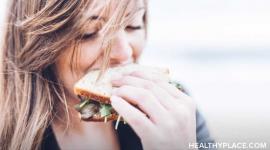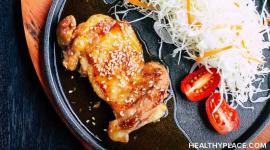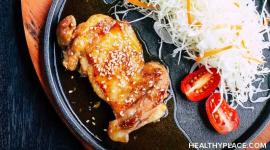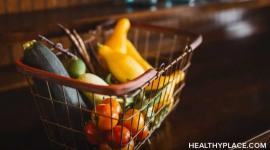Diet Plan for Depression and Anxiety
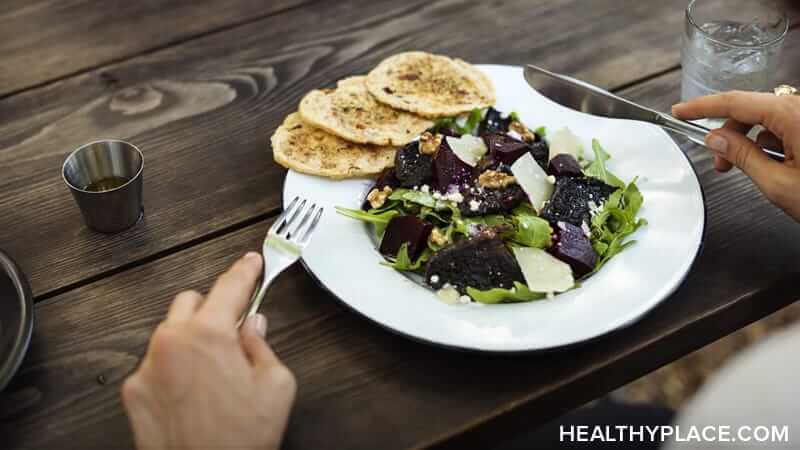
The best diet plan for depression and anxiety has multiple elements. Don’t let “multiple elements” scare you away. In fact, the main point of a diet plan to increase mental health and wellbeing is that it be simple. A good plan is so straightforward that it doesn’t feel like a diet plan at all but instead feels like a natural, and pleasant, part of your daily life.
Think of a diet plan to reduce depression and/or anxiety as a part of a balanced, healthy lifestyle. Nutrition is vital for mental health, but a fancy or fad diet isn’t necessary. Often, special diets don’t last, causing people to revert to unhealthy eating habits. Sometimes they can be harmful, throwing the body and brain off balance. Not only that, there is no single, special diet that has been proven to treat depression.
An effective, user-friendly, healthy diet plan for depression and anxiety involves these simple elements:
- What you eat
- How you eat
- When you eat
Diet Plan for Depression and Anxiety: What You Eat Matters
The brain needs nutrients to function well. In both depression and anxiety, the balance of certain neurotransmitters—serotonin, gamma-aminobutyric acid (GABA), noradrenaline, and dopamine—is off. Too much or too little of these chemicals disrupts mental health. Researchers are discovering that diet and nutrition are key factors in the production of neurotransmitters.
Neurochemicals are made in both the brain and gut directly from the foods we eat. The quality of our brain chemistry is connected to the quality of our diet. The simplest nutritional guideline included in a diet plan for depression and anxiety is to eat more healthy foods and fewer junk foods.
The brain depends on certain foods to get the nutrients it needs to stave off depression and anxiety. In general, a diet plan includes:
- Protein
- Complex carbohydrates
- Omega-3 fatty acids
- B vitamins
- Minerals
The examples above are just a few of the foods that combat depression in each category. Think balance. Choose foods to eat from each group every day, and you’ll fuel your brain to overcome depression and anxiety.
Avoiding junk foods is equally important. The more processed your food is, the less wholesome nutrients there are to help your brain. Replacing processed meats, refined sugars, fast food, and anything with saturated or trans fats with choices in the above category is a simple, healthy, and effective way to avoid the worst foods for depression and create a good diet plan for depression and anxiety.
How You Eat
While the types of nutrients you give your brain is the biggest component of your positive diet plan, other things you do matter to your wellbeing, too. One such thing is how you eat.
Eating on the run seems to have become common practice. A similar habit is eating at your desk while simultaneously working. Standing at the kitchen counter quickly eating is yet another eating style. These habits exacerbate stress and anxiety.
Another behavior that has evolved over decades is eating in front of the television or while using smart devices. When we do this, we eat mindlessly. This style of eating detaches us from those around us; after all, it’s difficult to connect deeply as a family when everyone is staring at the TV. This can undermine our sense of connection to our loved ones, a factor in depression.
A good diet plan for depression and anxiety involves intentional, mindful eating. Stop what you’re doing to eat. It won’t take long, and you just might find that you’re more efficient and you enjoy things more. It’s a natural way to reduce depression and anxiety.
Eating mindfully involves paying attention to your moment. Notice the healthy food you’re eating. Appreciate the taste. Draw your thoughts away from anxiety and depression and into the moment of eating.
When You Eat Should Be Part of Your Diet Plan for Depression and Anxiety
When you eat is an important part of a good diet plan for depression and anxiety. Follow your appetite.
It is common to turn to comfort foods when facing depression, anxiety, or both. This is fine if you’re making nutritious choices and doing it when you’re hungry. Many times, though, when we’re depressed, anxious, bored, or otherwise not feeling in our best mental shape, we seek out food despite not being hungry.
It’s bad for mental health, too, to skip meals. The brain requires a steady supply of nutrients and a stable blood sugar level to keep moods stable. Many nutritionists recommend eating five or six small meals rather than three large ones to avoid blood sugar spikes and drops as well as dips in the nutrient supply.
The best diet plan for depression and anxiety isn’t complicated, nor is it a potentially-dangerous fad diet promising miracle cures. The most effective diet involves balanced, wise nutritional choices to fuel your brain to do its work. Paying attention to how and when you eat are important components of an effective plan, too. Intentionally eat your way to relief from depression and anxiety.
APA Reference
Peterson, T.
(2021, December 30). Diet Plan for Depression and Anxiety, HealthyPlace. Retrieved
on 2026, January 2 from https://www.healthyplace.com/depression/food-and-depression/diet-plan-depression-and-anxiety
